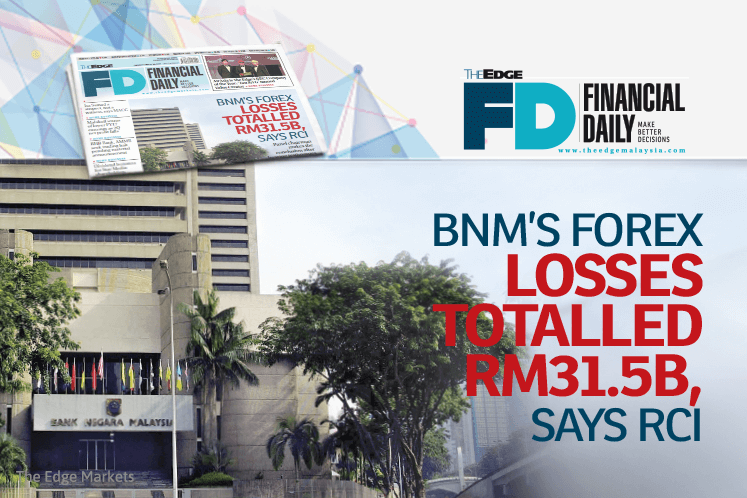
This article first appeared in The Edge Financial Daily on August 22, 2017
PUTRAJAYA: Bank Negara Malaysia (BNM) could have incurred up to RM31.5 billion in foreign exchange (forex) trading losses in the early 1990s, the Royal Commission of Inquiry (RCI) into the forex scandal concluded yesterday.
Chairman of the five-member commission Tan Sri Mohd Sidek Hassan (pic) said the panel came to the conclusion after hearing the testimonies of former BNM employees.
“We have made a finding today (yesterday) that BNM lost [about] RM31.5 billion,” Mohd Sidek said, adding that the figure ought to have been reported in BNM’s annual reports during the relevant period.
“We have to find out who [asked] for it to be hidden,” he added, at the end of the first day of hearing held at the Palace of Justice.
Former prime minister Tun Dr Mahathir Mohamad’s lawyer Mohamed Haniff Khatri Abdulla expressed surprise that Mohd Sidek had made the “unnecessary conclusion” on the very first day of the hearing.
Speaking to reporters outside the courtroom, Mohamed Haniff said such a conclusion should only be made at the end of the inquiry.
One former BNM staff, Abdul Aziz Abdul Manaf, testified earlier that the central bank lost RM31.5 billion over a four-year period between 1991 to 1994. Abdul Aziz, who was an accounts manager of BNM and was involved in the preparation of the central bank’s annual reports in 1992 and 1993, however, could not provide further details on the alleged losses, saying he was only in charge of the accounting treatment portion of the reports.
The inquiry set up as the result of a special task force formed in February to investigate the alleged forex losses, after former BNM assistant governor Datuk Abdul Murad Khalid claimed that the central bank suffered up to US$10 billion (about RM25 billion at that time) and not RM9 billion as was earlier reported by the central bank.
Abdul Murad testified at the inquiry yesterday, saying he was certain that no investigation was conducted by BNM or other enforcement agencies into the forex losses between 1988 and 1994.
He testified that the losses from the currency trading were not reflected in the profit and loss accounts of the central bank, but were instead recorded under the “other reserves” category of the bank’s accounts, in order to escape detection.
Abdul Murad also alleged that in 1992, he had informed the BNM governor at the time, (the late) Tan Sri Jaffar Hussein, that the forex losses BNM had suffered at that point was about US$170 million based on what was stated by the Chemical Bank in New York, but the governor did not believe him.
“The transactions were closed to the management. The governor was not aware,” he said, adding that only one or two people knew of the actual exposure.
He claimed that Jaffar had requested him to explain the forex losses to the then finance minister Datuk Seri Anwar Ibrahim.
He added that Anwar had acknowledged to him that if the actual losses were made public he would have to resign as finance minister.
Abdul Murad went on to say that he believed that if the amount of actual losses were revealed, “the finance minister, prime minister and cabinet ministers would have been held accountable.”
Another former BNM official testifying yesterday was Datuk Ahmad Hizzad Baharuddin, who said the central bank did not have a proper system of checks and balances with regard to the forex transactions during the relevant period.
He also informed the panel that BNM did not have an efficient computer system to capture the transactions and instead had to rely on a manual system.
At the outset of the hearing, a lawyer appearing for BNM, Datuk Tan Hock Chuan, requested that the inquiry be held behind closed doors due to the confidential nature of some of the bank’s reports.
He said the two former BNM staff who testified did not have immunity from any criminal action arising from a breach of the the Official Secrets Act.
Mohd Sidek, however, rejected Tan’s request, saying: “I’m advised this is an inquiry, not a trial. We’re commissioned by the [Yang di-Pertuan] Agong to do this.”
He said the Commission of Inquiry Act allows for all evidence given before the inquiry to enjoy absolute privilege, and witnesses are not liable for prosecution.
“If you claim everything [is covered by the] OSA, why have this inquiry? I will not allow any more debate, we are going ahead,” said Mohd Sidek.
The RCI chairman also rejected a request by lawyer Mohamed Haniff for a copy of the witness statements to be furnished to those who were holding watching briefs.
The other members of the RCI are the Special Task Force to Facilitate Business (or better known as Pemudah) chairman Tan Sri Saw Choo Boon, High Court judge Datuk Wira Kamaludin Md Said, BNM chief executive officer Datuk Seri Tajuddin Atan and Malaysian Institute of Accountants member K Pushpanathan.
The panel, which has been given five terms of reference, is required to submit its findings to the Yang di-Pertuan Agong by Oct 13.
The terms of reference include determining the validity of the claim that losses have been incurred by BNM due to forex speculation and its impact on the country’s economy, whether BNM’s forex exchange dealings had breached the Central Bank Ordinance 1958 or other laws, and whether there was an attempt to cover up the losses.